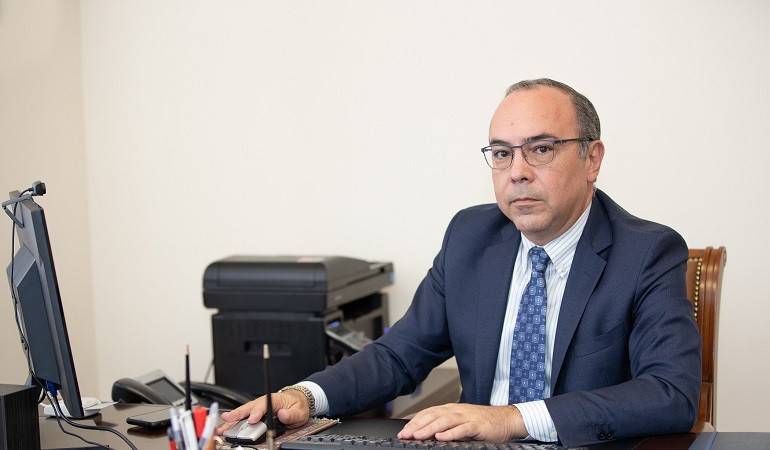Interview of the Adviser to the Foreign Minister of Armenia Ruben Karapetyan to “Riafan.ru” federal news agency
13 September, 2020Question: A number of media outlets, including the “Nezavisimaya Gazeta'', wrote that Syrian militants were being trained in Azerbaijan at the behest of Turkey. Please tell us what you think about this and do you intend to discuss this issue in the Arab countries?
Answer: The ongoing instability and crises in the region in recent years have been posing threats to both the security of Armenia and to normal functioning of the Armenian communities in the Middle East. Therefore, we cannot but be unconcerned about the aggressive expansionist policy of Turkey, which is aimed at creating an open confrontation in various parts of the region, thus deepening the already tense situation in the region further destabilizing it.
The information regarding the training of Syrian militants in the territory of Azerbaijan amid engagement in the hostilities against Armenia and Artsakh is a striking example of that. Given the precedents of the use of extremists by Azerbaijan and exporting the terrorist elements to different regions by Turkey, we take such a threat very seriously.
For years, Armenia has been raising this issue both in the international platforms and in the format of bilateral discussions with our partners. We have repeatedly warned about catastrophic consequences of such policy, especially after the aggression in April 2016, when the ISIS militants and the radicals of Turkish nationalist groups attacked the civilian population of Artsakh. As a responsible member of the international community Armenia supports the demilitarization of the region. We have called and will continue to call for more decisive actions to prevent the spread of the radical and extremist elements, particularly, when such elements serve as an instrument for achieving political goals of specific countries or their leaders.
Question: Can we say that this range of visits of the Foreign Minister symbolizes Armenia`s return to the Middle East?
Answer: Armenia’s new strategy in Middle East is aimed at active engagement in the regional processes in order to neutralize the obvious threats and challenges, derived from the on-going conflicts, civilian and proxy wars, unrestrained activities of terrorist groups and extremist border forces, as well as from the deepening of social-economic, financial, humanitarian and demographic crisis. Armenia is extremely interested in strengthening security and stability in the Middle East, which is itself an important component of Armenia’s security environment and is of strategic importance not only for the presence of the Armenian traditional communities in the region, but also for the protection and promotion of our national interests, which is equally important.
It is difficult to overestimate the importance of the Middle East for Armenia. We are connected by the historical and cultural commonalities. The Middle East is one of the centers of the origin of the traditional Armenian diaspora formed as a result of the Armenian Genocide in Ottoman Empire. And, to this day, despite the turmoil in the region which also affects the Armenian communities,, Armenians continue playing an important social-political role in the Middle East. It is not surprising that since the declaration of independence, excellent relations have been established with many countries in the region.
Established traditions of bilateral cooperation have been strengthened by our countries including high-level visits both at the level of state and government leaders. The Middle East has never lost its significance for Armenia. On the contrary, over the years, a strong tradition of humanitarian cooperation has been established in the region. Armenia carries out peacekeeping and humanitarian missions in the region, for example, in the framework of the UNIFIL peacekeeping mission in Lebanon. We have sent humanitarian aid to Syria and Lebanon many times, and will continue to do it.
The Armenian sappers in Syria carry out humanitarian demining in the war-free zone around Aleppo. Besides, several highly qualified doctors of various specialities have been included in the sappers group, who provide free medical care to the civilian population. After the devastating explosion in the port of Beirut, Armenia sent three planes carrying humanitarian aid to the victims of the explosion.
Our diplomatic presence in the region keeps expanding. Over the last year, we have opened two new Embassies in Tel Aviv and Doha and a General Consulate will soon be operational in Erbil. Bilateral relations with Jordan have significantly intensified. Last year, the President of Armenia paid a working visit to the kingdom, and at the beginning of this year, the King of Jordan made his first ever visit to Armenia.
The visit of Foreign Minister Zohrab Mnatsakanyan to the region is a significant step in terms of intensifying foreign policy relations with the Middle East region and it is also an important message that the region is of special interest to us, we will work towards deepening our relations. The new direction of our foreign policy in the Middle East is aimed at consistent activation of relations with the regional countries and the dynamic development of multi-vector cooperation.


